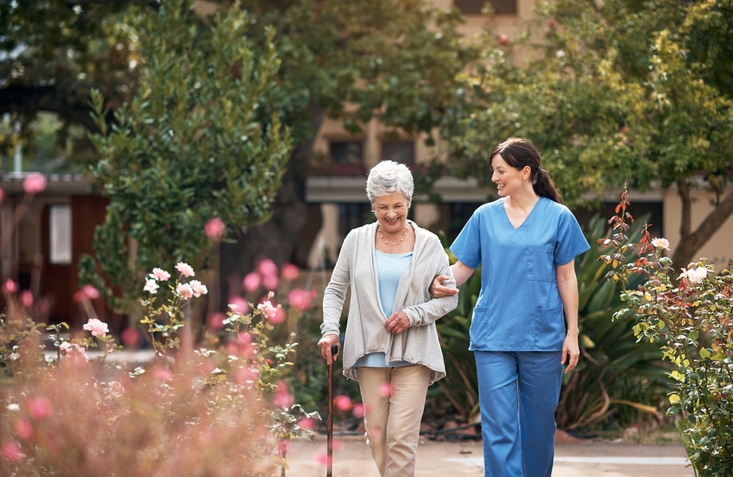A little time to ourselves is a good thing, but for many older adults, loneliness can quickly turn to depression. How can you best help an older loved one dealing with these difficult feelings? Senior HomeCare of Tucson’s experts in Tucson senior services and in-home care in nearby areas share tips for alleviating senior isolation.
Tip #1: Focus on Self-Care
When helping a loved one who is feeling isolated or managing depression, start by focusing on the individual’s self-care needs.
- Get enough sleep – Not getting enough sleep may increase a person’s risk of developing depression or other health concerns. Maintaining a sleep routine with a regular bedtime and waking time can help the older adult get enough sleep. Short naps during the day may be helpful, but too much daytime sleep can affect how well a person sleeps at night.
- Stay active – Gentle exercise, such as walking, yoga, and tai chi, help not only with physical strength and balance but also with boosting a person’s mood. Local group exercise classes are a great way to encourage healthy movement while being in a social environment as well.
- Eat well – Encourage the senior to enjoy a healthy diet including fruits, vegetables, whole grains, and lean proteins.
Tip #2: Find a Purpose in Life
It is important for everyone to have a sense of purpose in life, and that’s especially true for older adults. It’s not uncommon for seniors to have difficulty adapting to their new lives following retirement from a career or as the family caregiver. Helping a senior loved one find a new sense of purpose or things to enjoy each day can help with alleviating senior isolation and loneliness.
- Enjoy a hobby – Restarting a former hobby or finding something new to try is a great way to add more enjoyment and purpose to one’s day. There are many activities to try such as arts and crafts, writing, games, puzzles, and gardening, just to name a few.
- Give back – Helping others is a wonderful way to find purpose, and it allows seniors to use their skills and share their experience. There are many ways of giving back — from helping the family with babysitting or dog walking to volunteering at a community organization or school. Even helping with a chore at home can provide some meaning to a senior’s day.
- Connect with others – Visiting with family and friends can help alleviate senior isolation, and group activities and outings help too. Check out the classes, programs, and community events offered at many local senior centers and public libraries. Also, technology, such as video chats and phone calls, can help bring people together regardless of geography.
Tip #3: Get Support
Living alone can lead older adults to feel isolated and cut off from loved ones. You can help senior family members by spending time together, listening to them, and having pleasant conversations. Showing them how much you care can help them better manage feelings of isolation. If you are concerned that a loved one’s behaviors are changing or that they may be showing signs of depression, finding additional support is crucial.
- Seek professional help – Contact the senior’s physician if you observe any changes in behavior, decrease in appetite, sleep disturbances, or a lack of interest in activities they usually enjoy. These changes could be a sign of depression. The doctor may prescribe antidepressant medications and/or recommend therapy to help treat depression.
- Consider home care – A professional caregiver can come in to provide companionship for an older adult living alone. They can also help with tasks around the house, medication reminders, accompanied transportation, personal care, and more.
Senior Homecare of Tucson is dedicated to helping older adults enjoy more meaningful lives while being in the comfort of home. Our compassionate caregivers offer in-home caregiving services, including companionship for alleviating senior isolation, personalized to each person’s unique needs. Contact us today at (520) 355-4787 to learn more about our Tucson senior services and in-home care in the surrounding areas.

